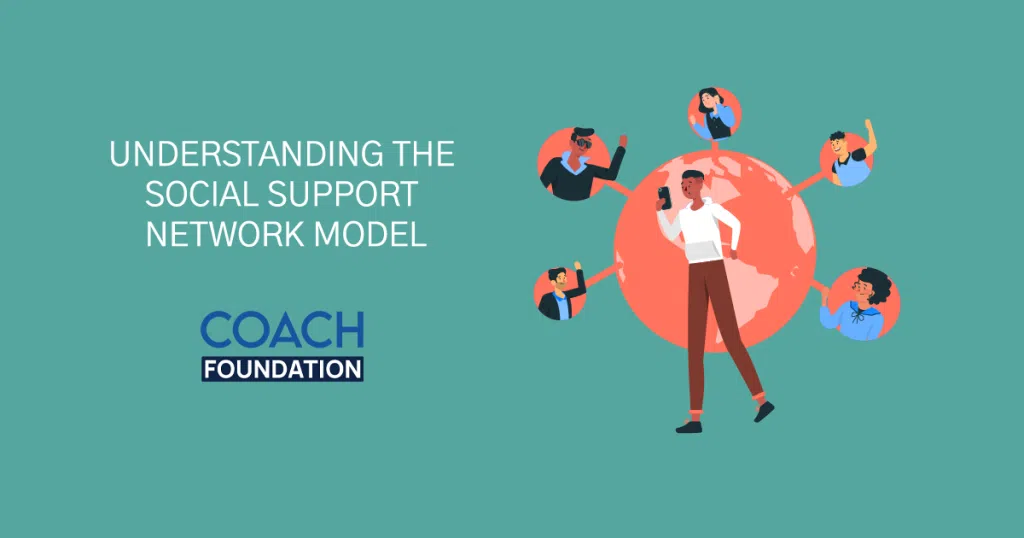Blog » Coaching Models and Techniques » Understanding The Social Support Network Model
Understanding The Social Support Network Model
The Social Support Network Model is a theoretical framework that emphasizes the importance of social support in promoting individual health and well-being. It suggests that individuals are embedded within a network of social relationships and that the quality and quantity of those relationships can have a significant impact on their physical and mental health.

The model emphasizes the importance of social support in buffering the effects of stress and promoting resilience. It suggests that social support networks can be an important resource for individuals facing difficult life circumstances. The model has important implications for the development of interventions aimed at promoting health and well-being.
In this blog, we’ll explore:
1. What is the social support network model
2. How does the social support network model work
3. Core Concepts of social support network model
4. Application of social support network model to life coaching
So, let’s get started!
- Understanding The Social Support Network Model
- What is the Social Support Network model
- How the social support network model works
- Types of social support
- Benefits of Having a Strong Social Support Network
- Strategies for Maintaining a social support network
- Applying the social support network model to Life Coaching
- Conclusion
- Frequently Asked Questions (FAQs)
What is the Social Support Network model
The Social Support Network model is a theoretical framework that describes the social relationships and interactions that individuals have within their social networks.
The model proposes that social support is a key resource that individuals can draw upon to help them cope with stress and improve their well-being.
The model suggests that social support can be obtained from various sources in one’s social network, including family, friends, coworkers, and community members. The model recognizes that the quality and quantity of social support that individuals receive can vary depending on the nature of the relationship and the specific circumstances of the stressful event.
The Social Support Network model also emphasizes the importance of social interaction and participation in social activities as a means of improving one’s social support. This may involve participating in group activities or organizations, volunteering, or simply spending time with friends and family.
Furthermore, the model highlights the reciprocal nature of social support, where individuals both give and receive support from their network. This reciprocity can help strengthen social ties and promote a sense of community and connectedness.
Check out this video to learn more about social support and its types!
How the social support network model works
The social support network model is a framework that focuses on how social networks can provide individuals with resources and support to help them cope with life’s stressors. The model suggests that social support can come from various sources, including family, friends, colleagues, and community organizations.
One of the early pioneers of this model was Dr. George Vaillant, who studied the lives of a cohort of men over several decades and found that the quality of their social relationships was a key predictor of physical and mental health outcomes.
The social support network model suggests that the availability and quality of social support can have a significant impact on an individual’s mental health, physical health, and overall well-being. It also highlights the importance of maintaining and nurturing social connections to enhance social support networks.
For example, in the context of career development, the social support network model can explain how individuals can rely on their relationships with mentors, peers, and colleagues to advance their careers. Mentors can provide guidance, feedback, and advice, while peers and colleagues can offer networking opportunities and support in navigating workplace challenges.
Similarly, in the context of education, the social support network model can explain how students can benefit from relationships with teachers, tutors, and classmates. Teachers and tutors can provide academic support and guidance, while classmates can offer social support and opportunities for collaborative learning.
Types of social support
There are four types of social support: emotional, informational, tangible, and companionship.
Emotional support: It is focused on providing comfort, empathy, and understanding to individuals who are going through a difficult time.
Informational support: It involves providing advice, guidance, or knowledge to help individuals navigate challenging situations.
Tangible support: It involves providing material assistance, such as food, money, or transportation.
Companionship support: It involves providing opportunities for social interaction and participation in enjoyable activities.
Learn about the types of social support in this article!
Benefits of Having a Strong Social Support Network
Having a strong social support network can have numerous benefits for overall well-being.
Positive impact on mental health: Social support can provide emotional comfort, reduce feelings of isolation and loneliness, and increase self-esteem and feelings of belonging. This can have a positive impact on mental health, including reduced rates of depression and anxiety.
Reduced stress levels: Social support can provide a buffer against stress, helping individuals cope with difficult situations and reducing the negative effects of stress on the body and mind.
Improved physical health: Social support has been linked to better health outcomes, including lower rates of chronic illness, improved immune function, and faster recovery from illness or injury. This may be due in part to the stress-reducing effects of social support.
Check out this article to learn more about how social support affects health.
Strategies for Maintaining a social support network
Maintaining a social support network requires effort and intentional action. Here are some strategies that can help:
Regular communication: Regularly staying in touch with friends and family members through phone calls, video chats, or in-person meetings can help maintain relationships and prevent feelings of isolation.
Show gratitude: Expressing gratitude and appreciation for the people in your support network can strengthen relationships and encourage reciprocity.
Plan group activities: Participating in group activities, such as dinners, outings, or hobby groups, can provide opportunities for social interaction and foster a sense of community.
A detailed overview of the tips for increasing social support can be inferred from this article!
Applying the social support network model to Life Coaching
The social support network model can be a valuable framework for life coaches to help their clients achieve their goals and improve their overall well-being. Here are some ways in which the model can be applied to life coaching:
Identifying support networks: Life coaches can work with their clients to identify individuals or groups who can provide support and encouragement as they work towards their goals. This may include friends, family members, colleagues, mentors, or other professionals.
Expanding support network: Life coaches can help their clients expand their support network by encouraging them to connect with others who share their interests or goals. This may involve introducing them to new people or groups or helping them develop skills to build relationships.
Maintaining a support network: Life coaches can also work with their clients to maintain their support network by encouraging regular communication, expressing gratitude and appreciation, and planning group activities or social events.
Conclusion
In conclusion, the social support network model recognizes the importance of social connections in promoting physical, emotional, and mental well-being. It emphasizes the role of social networks in providing support and resources to individuals during times of need. The model acknowledges that social networks can be diverse and can include family, friends, coworkers, and community organizations.
It also recognizes that the quality and quantity of social connections can influence the provision and receipt of social support. Overall, the social support network model underscores the importance of building and maintaining social connections to promote overall health and well-being. It highlights the need to cultivate supportive relationships and create an environment that fosters social connectedness.
So, what do you think of the social support network model? Let us know your thoughts on this in the comments below.
Frequently Asked Questions (FAQs)
1. What is the concept of the social support network model?
The social support network model is a framework for understanding the importance of social relationships and support for overall well-being. It emphasizes the value of diverse forms of social support, including emotional, informational, tangible, and companionship support. By leveraging the strengths and resources of one’s social support network, individuals can improve their ability to cope with stress, overcome challenges, and achieve their goals.
What are a few examples of the social support network model?
Here are three examples of the social support network model:
A cancer patient seeks emotional support from family members and friends to cope with the challenges of treatment and recovery. They also connect with a support group to gain informational support and learn coping strategies from others who have gone through similar experiences.
A new mother joins a mothers’ group to gain companionship support and connect with other parents who are going through similar challenges. She also seeks tangible support from her partner and family members to help with childcare and household tasks.
A student in a new city seeks to expand their social support network by joining a club or group related to their interests. They also seek informational support from a mentor or advisor to help them navigate their academic and career goals.
What are the pros and cons of the social support network model?
Here are some potential pros and cons of the social support network model:
Pros:
1. Provides a holistic approach to understanding and improving overall well-being
2. Emphasizes the importance of diverse forms of social support, which can increase resilience and coping skills
3. Offers practical strategies for individuals to build and maintain supportive relationships
4. Can be applied in a variety of contexts, including healthcare, education, and community development
Cons:
1. May oversimplify the complexities of social relationships and support systems
2. May not address structural barriers to accessing social support, such as poverty or discrimination
3. May not fully account for cultural differences in social support systems and values
4. May not be effective for individuals who prefer to rely on internal resources or who have difficulty building or maintaining social relationships

ABOUT SAI BLACKBYRN
I’m Sai Blackbyrn, better known as “The Coach’s Mentor.” I help Coaches like you establish their business online. My system is simple: close more clients at higher fees. You can take advantage of technology, and use it as a catalyst to grow your coaching business in a matter of weeks; not months, not years. It’s easier than you think.
AS SEEN ON





